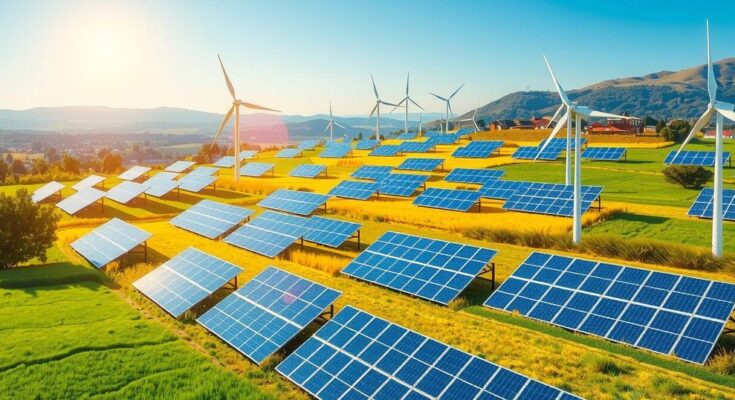Wärtsilä’s report outlines a roadmap for Nigeria to become 100% renewable by 2060, emphasizing the need for a data-driven energy strategy. Key elements include 1,200 GW of renewable capacity, 283 GW of energy storage, and a significant reduction of energy costs. The role of domestic gas as a transitional fuel is also noted, with substantial investments required to achieve these goals.
Wärtsilä, an international technology group, has published a report titled “Nigeria Leading Africa to Net Zero,” proposing a transformative pathway for Nigeria to achieve a 100% renewable energy system by 2060. The report emphasizes the necessity of a data-driven, cost-effective energy strategy to address Nigeria’s increasing energy demands and to establish universal electricity access for its citizens. The research utilizes advanced energy system modeling techniques to identify the most feasible power system developments over the coming years.
The analysis in Wärtsilä’s report indicates that an optimal energy system would require 1,200 GW of renewable energy capacity, alongside 283 GW of energy storage and 34 GW of engine-based power plants for effective grid balancing. It suggests that embracing renewable energy along with gas engine flexibility would significantly lower energy costs, enhance electricity accessibility, and bolster grid reliability. By 2060, the forecast predicts a 74% reduction in electricity generation costs compared to 2022 figures, while carbon emissions would be completely eliminated.
Moreover, the study highlights the importance of Nigeria’s domestic gas reserves as a critical element in the transition to a renewable energy system. Initially, natural gas can serve as an economical bridging fuel for balancing power generation from renewables until gas-powered plants are converted to utilize green hydrogen by the 2040s. Wale Yusuff, Managing Director of Wärtsilä in Nigeria, stated, “If the power system expansion roadmap presented in the report is successfully implemented, by 2060 Nigeria’s power system will be fully decarbonized… 2032, Nigeria can reach universal access to electricity, and the inefficient… diesel generators will be ancient history.”
To realize this ambitious renewable energy plan, Nigeria will need substantial financial investments totaling $18.7 billion by 2030 and $425 billion by 2060. Yusuff cautioned that while attracting such investments is feasible, it necessitates substantial policy reforms. He noted that despite existing efforts to establish a robust legal framework, project developers often face a challenging and uncertain investment climate.
With an abundance of natural resources including vast gas reserves and significant renewable energy potential, Nigeria is well-positioned to achieve a successful energy transition. To attain its goal of providing universal access to affordable and reliable electricity, the country must enhance its power transmission infrastructure, formulate effective policies, and implement a systematic, data-driven energy expansion plan focusing on renewable sources and flexibility.
Wärtsilä’s comprehensive report lays out a feasible strategy for Nigeria to transition to a wholly renewable energy power system by 2060. Success will hinge on ensuring substantial financial investments, undertaking necessary policy reforms, and enhancing the existing power transmission infrastructure. By leveraging its natural resources, Nigeria can significantly reduce energy costs, enhance reliability, and achieve universal electricity access in the coming years. The roadmap detailed in the report reflects an optimistic outlook for renewable energy in Nigeria, contingent upon collaborative efforts and strategic planning.
Original Source: www.itnewsafrica.com




